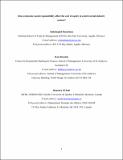Files in this item
Does corporate social responsibility affect the cost of equity in controversial industry sectors?
Item metadata
| dc.contributor.author | Hmaittane, Abdelmajid | |
| dc.contributor.author | Bouslah, Kais Ben Hmida | |
| dc.contributor.author | M’Zali, Bouchra | |
| dc.date.accessioned | 2019-07-25T12:30:02Z | |
| dc.date.available | 2019-07-25T12:30:02Z | |
| dc.date.issued | 2019-07-08 | |
| dc.identifier | 258881341 | |
| dc.identifier | 56a41046-6c0a-400d-b322-c9c83a39292f | |
| dc.identifier | 85069486656 | |
| dc.identifier | 000498983400005 | |
| dc.identifier.citation | Hmaittane , A , Bouslah , K B H & M’Zali , B 2019 , ' Does corporate social responsibility affect the cost of equity in controversial industry sectors? ' , Review of Accounting and Finance , vol. Ahead of print . https://doi.org/10.1108/RAF-09-2018-0184 | en |
| dc.identifier.issn | 1475-7702 | |
| dc.identifier.other | ORCID: /0000-0001-8407-8929/work/82179589 | |
| dc.identifier.uri | https://hdl.handle.net/10023/18165 | |
| dc.description.abstract | This study examines whether corporate social responsibility influences the cost of equity capital of firms operating controversial industry sectors. This paper computes the ex-ante cost of equity capital implied in analyst earnings forecasts and stock prices for a sample of 2,006 U.S. firm-year observations belonging to controversial industry sectors (alcohol, tobacco, gambling, military, firearms, nuclear power, oil and gas, cement and biotechnology) during the period 1991-2012. The baseline regression model links CSR score to the implied cost of equity capital (ICC) and controls for firm-specific characteristics, industry factors, and economic or market-wide factors. This model enables to capture the differential effect of CSR on ICC when the firm belongs to a specific sector of the controversial industries by adding an interaction term between CSR and the dummy variable representing this belonging. The findings show two main results. First, CSR engagement significantly reduces the implied cost of equity capital (ICC) in all controversial industry sectors, taken as a group, as well as in each one of these sectors individually. Second, this effect is more pronounced when the firm belongs to the alcohol and tobacco industry sectors. The findings have two important practical implications. First, they should increase managers’ confidence and incentives, in controversial industry sectors, to pursue CSR activities. Second, policymakers can encourage managers to undertake CSR initiatives in controversial industry sectors through tax incentives (e.g., reduce taxes for CSR related investment projects). This paper extends prior studies that investigate the perceptions of capital market participants of firm’s CSR commitment (e.g., Sharfman and Fernando, 2008; Goss and Roberts, 2011; El Ghoul et al., 2011; Jo and Na, 2012; Bouslah et al., 2013) by examining the effect of CSR on ICC in the controversial industry sectors. It contributes to the debate around the relevance of CSR in controversial sectors by providing evidence of the reduction effect of CSR activities on ICC in controversial industries and by showing that this reduction impact is more pronounced when the firm belongs to alcohol, tobacco industry sectors. | |
| dc.format.extent | 1727514 | |
| dc.language.iso | eng | |
| dc.relation.ispartof | Review of Accounting and Finance | en |
| dc.subject | Corporate social responsibility | en |
| dc.subject | Cost of equity capital | en |
| dc.subject | Controversial industry sectors | en |
| dc.subject | HG Finance | en |
| dc.subject | 3rd-DAS | en |
| dc.subject | SDG 12 - Responsible Consumption and Production | en |
| dc.subject.lcc | HG | en |
| dc.title | Does corporate social responsibility affect the cost of equity in controversial industry sectors? | en |
| dc.type | Journal article | en |
| dc.contributor.institution | University of St Andrews. School of Management | en |
| dc.contributor.institution | University of St Andrews. Centre for the Study of Philanthropy & Public Good | en |
| dc.contributor.institution | University of St Andrews. Centre for Responsible Banking and Finance | en |
| dc.identifier.doi | https://doi.org/10.1108/RAF-09-2018-0184 | |
| dc.description.status | Peer reviewed | en |
| dc.date.embargoedUntil | 2019-07-08 |
This item appears in the following Collection(s)
Items in the St Andrews Research Repository are protected by copyright, with all rights reserved, unless otherwise indicated.

